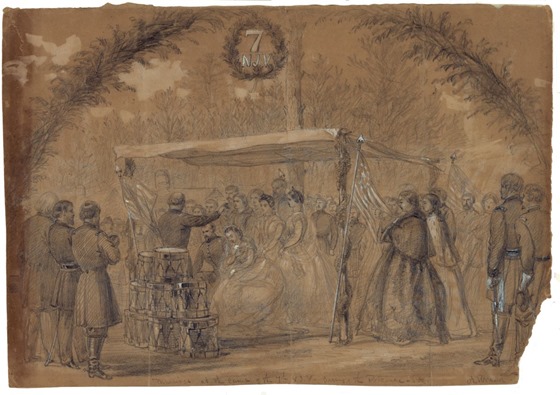Marriage of Captain Daniel Hart and Nellie Lammond, March 12, 1863.
______
On the 12th inst., marriage rites were celebrated in camp, this being the first occasion of the kind that has ever transpired in the army of the Potomac. Of course it “drew,” as all novelties do, and created a sensation in camp for a week preceding the affair. We, being on the staff, of course received a card…
(Troy NY Daily Times, March 24, 1863)
_____
WE reproduce on page 216 a picture of Mr. Waud’s, representing A MARRIAGE IN THE CAMP OF THE SEVENTH NEW JERSEY VOLUNTEERS in the Army of the Potomac. Mr. Waud writes:
“An event to destroy the monotony of life in one of Hooker’s old regiments. The camp was very prettily decorated, and being very trimly arranged among the pines, was just the camp a visitor would like to see. A little before noon the guests began to arrive in considerable numbers. Among them were Generals Hooker, Sickles, Carr, Mott, Hobart Ward, Revere, Bartlett, Birney, Berry, Colonel Dickinson, and other aids to General Hooker; Colonels Burling, Farnham, Egan, etc. Colonel Francine and Lieutenant-Colonel Price, of the Seventh, with the rest of the officers of that regiment, proceeded to make all welcome, and then the ceremony commenced. In a hollow square formed by the troops a canopy was erected, with an altar of drums, officers grouped on each side of this. On General Hooker’s arrival the band played Hail to the Chief, and on the approach of the bridal party the Wedding March. It was rather cold, windy, and threatened snow, altogether tending to produce a slight pink tinge on the noses present; but the ladies bore it with courage, and looked, to the unaccustomed eyes of the soldiers, like real angels in their light clothing. To add to the dramatic force of the scene, the rest of the brigade and other troops were drawn up in line of battle not more than a mile away to repel an expected attack from Fredericksburg. Few persons are wedded under more romantic circumstances than Nellie Lammond and Captain De Hart. He could not get leave of absence, so she came down like a brave girl, and married him in camp. After the wedding was a dinner, a ball, fire-works, etc.; and on the whole it eclipsed entirely an opera at the Academy of Music in dramatic effect and reality.” (Harper’s Weekly, April 4, 1863)
Drawing by Alfred R. Waud, Maarch 18, 1863.
Library of Congress image.
Marriage at the camp of the 7th N.J.V. poster available at Zazzle.com





